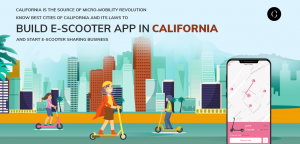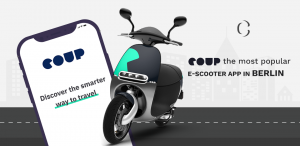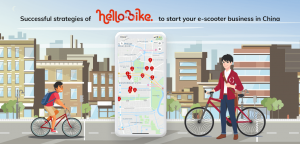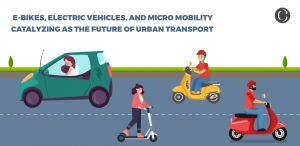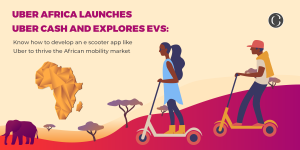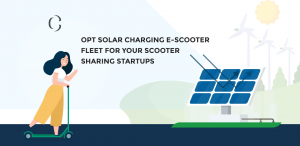Know how did e scooters go from alarming tech invention to a sustainable travel solution in times of coronavirus recovery with brand new profitable models

E scooters are comparatively newbies in the mobility industry, but their story of novelty has evolved rapidly and the one with added benefits in this era of social distancing. With the world recovering back to normal life, some countries in the world are rolling out aggressive schemes to promote e-scooter sharing, while others have still banned them outright.
Let’s have a look at the interesting journey of e-scooters from popular tech innovation to the contentious form of transport to a sustainable form of transportation.
E-scooters have gained huge popularity in a very short time after their launch due to its major benefits including eco-friendly transport, affordable and accessible for last-mile commute, etc. In 2018 when the startups like Bird and Lime launched shared e-scooters service in the USA, soon after their success, many startups rapidly emerged internationally including European startups Voi and Tier.
In just two years the e-scooter sharing schemes are available in more than 20 countries of the world although Europe and the US continue to dominate the industry in terms of use. Shared e-scooters in operation are expected to increase to 4.6 million by 2024 from 0.7 million in 2019.
But with the rise of e-scooters has been the rise of fatal accidents due to many reasons including not using friendly infrastructure, lack of regulations, dockless sharing services, etc. which pose danger to the life of riders, kids, old aged persons, disables, and pedestrians.
Although safety was not the only issue. Although e-scooters are emission-free at the point of using, the process of manufacturing and managing them produces a significant amount of greenhouse gas emissions and it increases with the shorter lifespan.
According to the research by Lufthansa Innovation Hub, average emissions of dockless e-scooters are higher than those of trains, buses, fossil-fueled vehicles, hybrid cars, and privately owned EVs. But it also suggested measures to reduce such emissions such as reducing the number of trips by operational vehicles, increasing their lifespan, etc.
Resulting e-scooters were banned on public pavements in many countries including Jakarta, Paris, Shanghai, Singapore, and the UK. While others imposed strict restrictions on the number of fleets, hours of operation, parking, and speed limits, etc.
Seemingly, shared e-scooter companies had also paid close attention to such sustainability concerns by introducing the use of renewable energy, swappable batteries to reduce the need for frequent moving e-scooters away to charge, and better designs and repairs to increase their lifespans, etc.
Such an apparent commitment of the micro-mobility companies to sustainability in operation inspired the local governments without any doubt to promote the use of e-scooters in this critical time of easing lockdown norms as micro-mobility adheres to the current need of social distancing. Although their operation was taken out of service during lockdowns, they are slowly returning on the roads with ramped-up safety measures.
Retailers have also reported increased sales of private e-scooters even in places where they are still illegal including Finland, Ireland, and the UK. Things are set to change quite extensively in the UK, though by holding fast-tracked trials to legalize the use of e-scooters on public roads.
Brisbane also extended its e-scooter trials by a year and expanded its existing provision into the suburbs to increase active transportation amid coronavirus recovery.
Bogotá also amended its e-scooter regulations to allow more shared e-scooter service providers to operate post-lockdown.
The Italian government established the separate Covid-19 Task Force, which has partnered with e-mobility giant Helbiz and welcomed its first e-scooter in operation to promote socially distancing in mobility across the country. The government is also offering subsidies to Italians for buying an e-scooter.
Below are some of the measures taken by popular shared-mobility players in the world to ensure the safe and sustainable ride experience to commuters during the pandemic.

(Source: FutureBridge)
Dynamics of the shared mobility system during this new normal:
Short-term checkout:
This model is popularly known as bike rental/bike hire/zero generation and generally used by day-trippers and tourists. In this model, an e-scooter can be rented from one station and returned to the same location only. These stations are regulated by their employees. In this time short-term checkouts are less popular as it involves the frequent need for sanitization and safety precautions by the operators, which is quite time-consuming and expensive.
Long-term checkout:
In this model, e-scooters may be lent for a minimal or free of charges with a refundable deposit. A bike can be typically kept for a longer period of time. This model is very much in use these days, as it reduces the chances of transmission of the virus to some extent while including rider familiarity and readiness. But at the same time, the maintenance cost of the e-scooter will be increased significantly in this model as it is mostly used less frequently in this model compared to any other.
White bikes:
This model is very much popular in the Netherlands where they are popularly called free bikes/ unregulated bikes. It’s a first-generation model where e-scooters/e-bikes are generally kept in a specified area and can be used by anyone but designated to be used within some specified boundaries. Certainly, for now, this model is very risky and can’t be used as it involves a lot of uncontrolled human interactions.
Coin deposit stations:
These are also known as second-generation bikes. The e-bikes have a slot into which a coin needs to be pushed as a deposit to unlock the bike from the station and can be hired for an unlimited period of time for free of charges. You can retrieve the deposited coin after returning the bike at the station.
Automated stations:
These are 3rd-gen docking stations that are special racks that lock and unlock the scooters with computer control. They consist of e-scooters/e-bikes that can be rented from these computerized stations or docks and can be returned to different stations belonging to the same system. Individuals have to register themselves with the program in order to use the service. This system is best suited for this pandemic condition as it involves minimal human contact.
Dockless bikes:
It is popularly known as free-floating bike/call a bike/4th-gen service, etc. Mobike is the world’s biggest dockless bike operator with an e-lock. As this system does not require docking stations, its network has expanded rapidly on a global level.
Evolving profitable model for shared mobility during the times of coronavirus recovery:
Many countries in the world are in various levels of quarantine due to the COVID-19 pandemic. As a result, the shared mobility sector has been hit hard and the operators of every scale are struggling to find businesses. Below we are sharing some profitable models through which you can pace your micro-mobility business.
Working with delivery services:
This pandemic has significantly shifted both the target user base as well as the fundamental utility of shared mobility. But the companies need to readjust their service according to where there is more demand in order to survive in the market. Covid-19 has established a perfect match between delivery platforms and utilization-driven shared mobility operators.
Several shared mobility services are joining the delivery services, as online shopping is drastically increasing with more and more people staying inside. Logistics companies, Restaurants, Supermarkets can now reserve and use vehicles from the shared mobility stations, for a fixed price, and for specified time slots for their deliveries. For example:
- VOI has partnered with several Nordic cities allowing restaurant workers to use their scooters for food delivery.
- Lyft has partnered with Amazon for delivery in the USA.
- Green Mobility has collaborated with local restaurants in Denmark for their food delivery.
- ELOOP, the Vienna-based car-sharing company is now offering special rates exclusively for delivery drivers who use its service.
Some operators are also readjusting their pricing modules according to the current economic conditions.
- re.volt, the electric car-sharing company is offering inhabitants in Prague a 50% off on all fares.
- Zity has temporarily eliminated its dynamic pricing and fixed lower prices in Madrid.
- Socar is increasing the rental period of its cars for longer-term with discounted rates in Korea.
Provide convenience and safety to high risked groups:
In times of crisis, fast and efficient mobility has become a valuable resource particularly for those who are fighting the pandemic on the frontlines such as in hospitals, nursing homes, police stations, etc.
It is inspiring to see a number of companies are offering their mobility services exclusively to these high risked groups in this critical situation.
- Uber is offering complimentary rides of up to £15, as well as Uber Eats vouchers of £10 Uber Eats vouchers, to anyone in London with an NHS email address.
- Share NOW is offering special 30-day rental packages for healthcare workers.
- Virtuo is dedicating 100 cars for free from its fleet for medical staff in France.
- Poppy Mobility is offering free rides in its cars to medical workers in Antwerp and Brussels.
- Sixt Share is offering €100 ride vouchers for all medical staff in Berlin, Hamburg, and Munich.
- WeShare is mobilizing its fleets to make critical food and supply deliveries to charities in Berlin.
- Lyft is offering medical transportation to people from low-income backgrounds in the USA.
- Moia is providing free shuttles between 12 am to 6 am in Hamburg.
- Free NOW is offering €50 vouchers to over 300 000 citizens over the age of 65 in Vienna.
Summing up:
While the shared mobility business may never be back to normal but can certainly shift to new normal. Launch your own Uber clone app for the e-scooters sharing business with Coruscate, the leading e-scooter app development company across the globe. We offer a customized solution as per your business needs and fleet types.
Contact our experts now to get a detailed understanding of our development process, advanced features, pricing structure, and personalized solution.



